
Book a Consultation
Thank you!
Your form has been sent successfully.

The lacrimal gland secretes tears and is located on the top and sides of the eyes. A tumor in the lacrimal gland region develops when the gland cells multiply and grow uncontrollably, resulting in an abnormal mass of tissue. This type of tumor may be cancerous or non-cancerous (benign).
According to the American Society of Clinical Oncology, various types of lacrimal gland tumors are as follows:
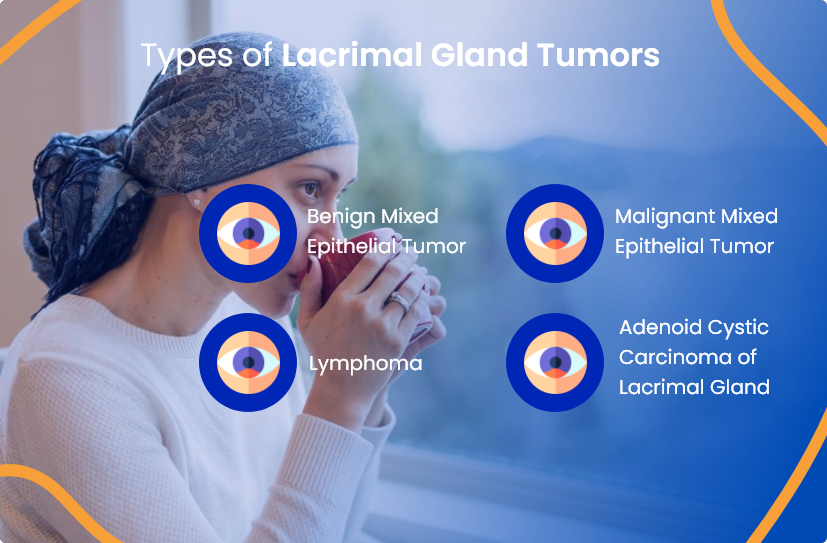
This is a non-cancerous tumor that arises in the cells lining the lacrimal gland. It does not metastasize to other body parts, but it will grow if left untreated.
This type of tumor starts in the cells lining the lacrimal gland and spreads to other body parts if left untreated.
Lymphoma is a rare lacrimal gland cancer where lymphocytes (white blood cells) multiply rapidly. The majority of lymphomas are low-grade with a good prognosis. Non-Hodgkin’s lymphoma is the most common eye-related lymphoma.
It is a rare form of lacrimal gland carcinoma, which often pushes the eye forward, causing it to bulge. This carcinoma can affect local nerves, which causes pain in the affected area.
Common signs and symptoms of lacrimal gland cancer may include:
 Blurry vision
Blurry vision
 Swelling around the eye
Swelling around the eye
 Double vision
Double vision
 Pain in and around the eye
Pain in and around the eye
 Unexplained feeling of fullness in the eyelid
Unexplained feeling of fullness in the eyelid
Lacrimal gland cancer treatment options depend on the type and stage of cancer and the patient's overall health.
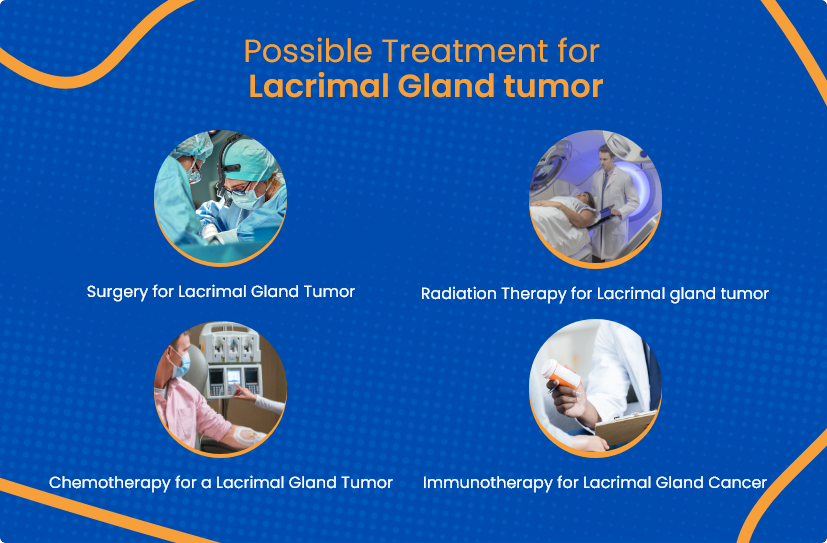
Ophthalmologists (eye surgeons) surgically remove the tumor with some surrounding healthy tissue. It is the most common treatment for lacrimal gland tumors. The extent of surgical removal depends on the size and spread of the cancer.
This cancer treatment method uses high-energy radiation to kill cancerous cells to treat lacrimal gland carcinoma. Radiation can be delivered via an external machine outside of the body, called external beam radiotherapy. Various types of external beam radiation are:
Chemotherapy uses systemic anti-cancer drugs, which enter the bloodstream, reach, and destroy rapidly growing cancer cells. For treating lacrimal gland cancer, chemotherapy drugs may be delivered through a catheter in the groin region. Imaging technology guides the position of the catheter to reach the blood vessel of the eye..
Immunotherapy treatment, also called biologic therapy, enhances the immune system's ability to target and destroy lacrimal gland cancerous cells.
For a definitive diagnosis of this tumor, various methods are used after considering the patient's symptoms, age, and general health.

A small sample of tissue is removed for microscopic examination. Based on the tumor's location, different types of biopsies are performed. Various types of biopsies include incisional, excisional, and fine-needle biopsies.
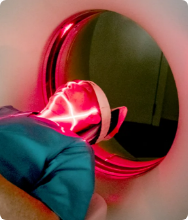
CT scan is a series of x-ray images from different angles that forms a 3-dimensional image. It results in detailed cross-sectional images of tissues. It helps identify abnormalities in tissues and measure the tumor's size.
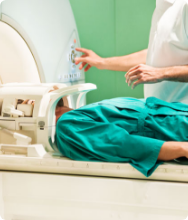
MRI uses strong magnetic waves to take multiple detailed computerized images of the tumor. It helps to determine the size and exact location of cancer. A contrast medium can be injected into the vein or given orally to provide better details on the image.
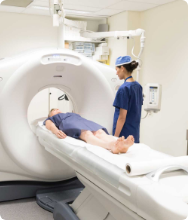
PET is a nuclear-medicine diagnostic procedure that uses a radioactive tracer, i.e., positron, to visualize tissues' metabolism and biochemical functions. A small radioactive substance is injected into the body, mainly absorbed by cancerous cells. PET then produces the image of the tumor by detecting this substance
The oncologists at ACTC in Florida are dedicated to providing exceptional patient care - prescribing effective personalized and evidence-based treatment plans for their patients. We strive to establish a positive environment for patients and their families throughout their cancer journey focusing on physical and mental health simultaneously. We have some of the most accomplished cancer specialists working on our team.
The following are our providers who you can consult at ACTC:

MD, Hematology & Oncology

MD, Ph.D., Hematology/ Medical Oncology

MD, Radiation Oncologist

If you or a loved one has been diagnosed with lacrimal gland cancer, a detailed discussion with your primary physician will help you understand your condition better. You physician will then refer you to an advanced specialty center such as ACTC in Florida.
As one of Florida's best cancer centers, we understand how a cancer diagnosis and therapy impact a person's physical and emotional well-being. Therefore, we work hard to make patients and their families feel secure. We understand how imperative it is for you and your loved one to make informed choices and play an active part in your medical care. We at ACTC strive to support you at every step of diagnosis, staging, treatment, and long-term follow-up in one convenient location. Our cancer specialists are supported by qualified clinical staff with over two decades of experience and a reputation for providing personalized cancer treatment.
Schedule a consultation by calling
 352-345-4565
352-345-4565
According to the American Society of Clinical Oncology, lacrimal gland tumor is rare, where 1 in 1 million are diagnosed yearly.
Surgical removal of the lacrimal gland is the most common treatment for lacrimal gland cancer. The extent of removal of the surrounding affected area depends on the tumor size.
ACTC is one of Florida's leading cancer specialty centers, which offers personalized and comprehensive cancer care in a modern, state-of-the-art facility close to home. You can schedule a consultation by calling 352-345-4565 or completing the online form below. (we can give the link to the form here)
Schedule a consultation by calling
 352-345-4565
352-345-4565